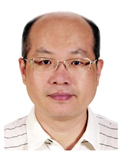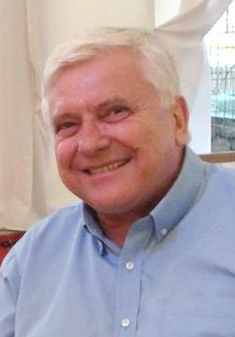Invited Speakers
Title: On the Wiener Index Spanning Tree Problem
 |
Speaker: Sheng-Lung Peng, National Dong Hwa University, Hualien 974, Taiwan |
Abstract: The Wiener index was first proposed in chemistry for characterizing molecular structures based on the count of path distances between carbon atoms. Latter, it was defined in graph theory as follows. The Wiener index of a graph is the sum of all pairwise distances of vertices of the graph. In this talk, we consider the Wiener index spanning tree problem. Given a graph G, the maximum (minimum) Wiener index spanning tree problem on G is to find a spanning tree T of G such that the Wiener index of T is the maximum (minimum) among all possible spanning trees of G. Recently, it has been shown that the minimum Wiener index spanning tree of a wireless sensor network is better than its minimum spanning tree while considering the routing issue. In this talk, we consider the algorithmic results for the Wiener index spanning tree problem.
Biography:Sheng-Lung Peng is a full Professor of the Department of Computer Science and Information Engineering at National Dong Hwa University, Taiwan. He received the BS degree in Mathematics from National Tsing Hua University, and the MS and PhD degrees in Computer Science and Information Engineering from the National Chung Cheng University and National Tsing Hua University, Taiwan, respectively. His research interests are in designing and analyzing algorithms for Bioinformatics, Combinatorics, Data Mining, and Networks.
Dr. Peng has edited several special issues for journals, such as Soft Computing, Journal of Internet Technology, Journal of Computers and MDPI Algorithms. He is also a reviewer for more than 10 journals such as IEEE Transactions on Emerging Topics in Computing, Theoretical Computer Science, Journal of Computer and System Sciences, Journal of Combinatorial Optimization, Journal of Modelling in Management, Soft Computing, Information Processing Letters, Discrete Mathematics, Discrete Applied Mathematics, Discussiones Mathematicae Graph Theory, and so on. He published more than 100 international conferences and journal papers.
Dr. Peng is now the Dean of the Library and Information Services Office of NDHU, an honorary Professor of Beijing Information Science and Technology University of China, and a visiting Professor of Ningxia Institute of Science and Technology of China. He is a director of Institute of Information and Computing Machinery (IICM), and of Taiwan Association of Cloud Computing (TACC) in Taiwan. He is also a supervisor of Chinese Information Literacy Association and of Association of Algorithms and Computation Theory (AACT). He has been serving as a secretary general of TACC from 2011 to 2015, of AACT from 2013 to 2016, and of IICM from 2015 to 2018. He was a convener of the East Region of Service Science Society of Taiwan from 2014 to 2016. He was also the regional director of the 2017 ACM-ICPC Contest Council for Taiwan.
Title: New Computational Intelligence techniques in software reliability engineering
 |
Speaker: Florin Popentiu Vladicescu, University Politehnica of Bucharest, Romania |
Abstract:SRE (Software Reliability Engineering) will benefit by new advancements in Computational Intelligence along reliability data analysis, optimal reliability allocation, and software reliability estimation.
This work describes recent developments based on neural networks, neutrosophic models, and nature inspired algorithms for software reliability modelling and optimization.
Biography: Florin Popentiu Vladicescu, was born on 17 September 1950, graduated in Electronics and Telecommunications from University POLITEHNICA of Bucharest in 1974, holds a PhD in Reliability since 1981. He has been appointed Director of the “UNESCO Chair in Information Technologies Department” at University of Oradea. Also, he is Associated Professor with University “Politechnica” of Bucharest, Faculty of Automatic Control and Computer Science. Professor Florin Popen?iu Vl?dicescu is the founder of the first “UNESCO Chair of Information Engineering” , in UK, established at City University London, in 1998. He published over 150 papers in international journals and conference proceedings. Also he is author of one book co-author of 4 books.
He has worked for many years on problems associated with software reliability and has been Co-Director of two NATO Research Projects. Also he is on the advisory board of several international journals, including “Reliability and Risk Analysis: Theory & Applications” and is a reviewer to “ACM Computing Reviews. He is currently Associated Editor to the International Journal of Information and Communication Technology (IJICT) – Inderscience Publishers.
He is an independent expert to the European Commission - H2020 programme, for Net Services – Software and Services, Cloud.
Professor Popen?iu Vl?dicescu is currently Visiting Professor to "ParisTech". He also lectures to the Technical University of Denmark (DTU). He was elected Fellow of the Academy of Romanian Scientists in 2008.
More information can be find on the following web page: http://www.staff.city.ac.uk/~pop/
Title: Bio-Inspired Optimization of Type-2 Fuzzy Logic Systems
 |
Speaker: Oscar Castillo, Tijuana Institute of Technology, Tijuana, Mexico |
Abstract: The design of Type-2 fuzzy logic systems is a complex task and in general achieving an optimal configuration of structure and parameters is time consuming and rarely found in practice. For this reason the use of bio-inspired meta-heuristics offer a good hybrid solution to find near optimal designs of type-2 fuzzy logic systems in real world applications. In particular, type-2 fuzzy control offers a real challenge because the problems in this area require very efficient and accurate solutions; in particular this is the case for robotic applications. Another important application of type-2 fuzzy logic is in pattern recognition problems. In this talk we present a general scheme for optimizing type-2 fuzzy systems with bio-inspired optimization techniques, like ant colony optimization, the chemical reaction algorithm, bee colony optimization and others.
Biography: Oscar Castillo holds the Doctor in Science degree (Doctor Habilitatus) in Computer Science from the Polish Academy of Sciences (with the Dissertation “Soft Computing and Fractal Theory for Intelligent Manufacturing”). He is a Professor of Computer Science in the Graduate Division, Tijuana Institute of Technology, Tijuana, Mexico. In addition, he is serving as Research Director of Computer Science and head of the research group on Hybrid Fuzzy Intelligent Systems. Currently, he is President of HAFSA (Hispanic American Fuzzy Systems Association) and Past President of IFSA (International Fuzzy Systems Association). Prof. Castillo is also Chair of the Mexican Chapter of the Computational Intelligence Society (IEEE). He also belongs to the Technical Committee on Fuzzy Systems of IEEE and to the Task Force on “Extensions to Type-1 Fuzzy Systems”. He is also a member of NAFIPS, IFSA and IEEE. He belongs to the Mexican Research System (SNI Level 3). His research interests are in Type-2 Fuzzy Logic, Fuzzy Control, Neuro-Fuzzy and Genetic-Fuzzy hybrid approaches. He has published over 300 journal papers, 10 authored books, 40 edited books, 200 papers in conference proceedings, and more than 300 chapters in edited books, in total more 770 publications according to Scopus (H index=49), and more than 900 according to Research Gate (H index=61). He has been Guest Editor of several successful Special Issues in the past, like in the following journals: Applied Soft Computing, Intelligent Systems, Information Sciences, Non-Linear Studies, Fuzzy Sets and Systems, JAMRIS and Engineering Letters. He is currently Associate Editor of the Information Sciences Journal, Applied Soft Computing Journal, Granular Computing Journal and the IEEE Transactions on Fuzzy Systems. Finally, he has been elected IFSA Fellow and MICAI Fellow member last year. He has been recognized as Highly Cited Researcher in 2017 by Clarivate Analytics because of having multiple highly cited papers in Web of Science.




